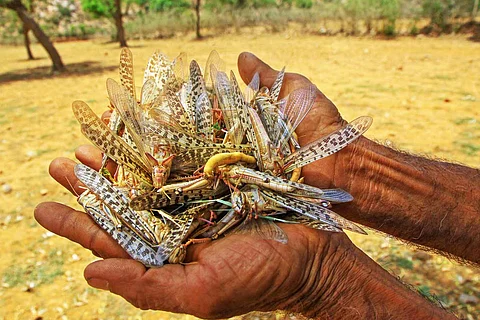

Thanks to the sudden thunderstorms accompanied by heavy wind and rainfall, swarms of locusts that were expected to enter Telangana seem to have changed direction. This was stated in a report submitted by a five-member team who conducted a survey in Telangana's districts bordering Maharashtra to take stock of the situation.
The team consisted of SJ Rahman, a professor from the Jayashankar Telangana State Agricultural University, Suneetha from the Central Integrated Pest Management Centre, Hyderabad, Mancherial District Collector Bharathi, Warangal conservator of forests Mohammed Jalaluddin Akbar and Ramagundam Commissioner of Police V Satyanarayana.
“As per the report submitted by the team to the Telangana government, the wind direction has changed and as a result, the locusts may not enter Telangana. Right now, they are in Maharashtra and may enter Chhattisgarh, but they are being controlled in those areas," an official of the Agricultural Department said.
Stating that there could be a possibility of a locust attack at the border districts if the wind changed directions, the official said that the local administration was prepared to deal with the situation.
“With the coordination of agricultural and horticultural officers, District Collectors are prepared and ready for the situation. In case the situation arises, immediate action will be taken by them," he added.
He further said that preventive measures are in place. Chemicals like malathion, lambda-cyhalothrin and chlorpyrifos are kept ready with spraying equipment like fire engines and jetting machines.
Reports said that a major locust attack took place in Telangana 90 years ago in the princely state of Hyderabad during the rule of the Nizam. Measures were then taken on the recommendations made by the Imperial Council of Agricultural Research, which is now Indian Council of Agricultural Research (ICAR), including reducing the agricultural tax and introducing some biological control measures.
A locust is a large grasshopper-like insect, which migrates in vast swarms. The ones that have entered India are desert locusts, which are short-horned grasshoppers. These migratory pests are known to damage crops and green vegetation for fodder.
Earlier this week, the District Agricultural Officers of seven northern Telangana districts – Adilabad, Nirmal, Asifabad and Mancherial, Nizamabad, Kamareddy and Jayashankar Bhupalapally – were asked to be alert to prevent damage due to the potential infestation.